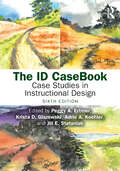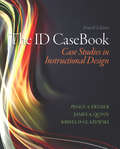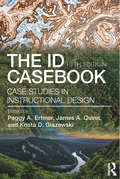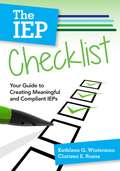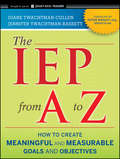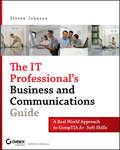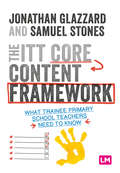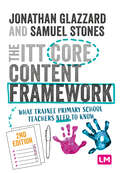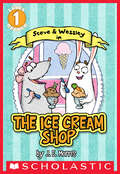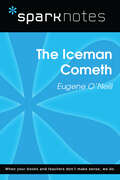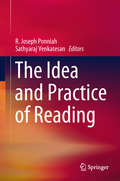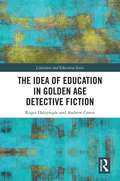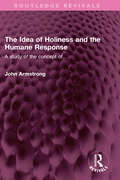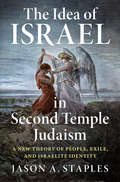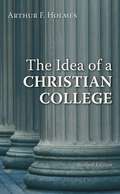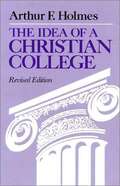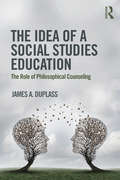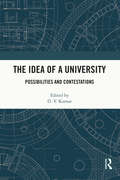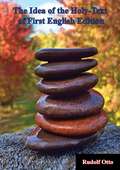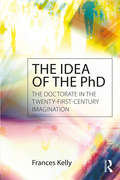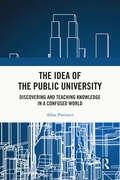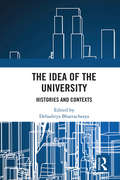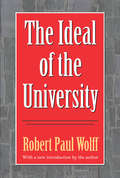- Table View
- List View
The ID CaseBook: Case Studies in Instructional Design
by Peggy A. Ertmer Krista D. Glazewski Jill E. Stefaniak Adrie A. KoehlerThe ID CaseBook provides instructional design students with 25 realistic, open-ended case studies that encourage adept problem-solving across a variety of client types and through all stages of the process. After an introduction to the technique of case-based reasoning, the book offers four sections dedicated to K–12, informal learning, post-secondary, and industry clients, respectively, each comprising varied, detailed cases created by instructional design experts. All cases, alongside their accompanying discussion questions, encourage students to analyze the available information, develop action plans, and consider alternative possibilities in resolving problems. This revised and updated sixth edition attends to the profound impacts that public health crises; urgent access, equity, and inclusion needs among diverse learners; and a rapidly expanded reliance on digital learning formats have had on the design of learning today.
The ID CaseBook: Case Studies in Instructional Design
by Peggy A. Ertmer James A. Quinn Krista D. GlazewskiFirst Published in 2017. Routledge is an imprint of Taylor & Francis, an Informa company.The Fourth Edition of this highly regarded problem-solving text presents 30 realistic case studies in a wide range of authentic contexts, from K-12 to post-secondary, corporate, and manufacturing. The cases and their accompanying discussion questions encourage ID students to analyze the available information, develop conclusions, and consider alternative possibilities in resolving ID problems.
The ID CaseBook: Case Studies in Instructional Design
by Peggy A. Ertmer James A. Quinn Krista D. GlazewskiThe fifth edition of The ID CaseBook provides instructional design students with 26 realistic, open-ended case studies that encourage adept problem-solving across a variety of client types and through all stages of the process. After an introduction to the technique of case-based reasoning, the book offers three sections dedicated to K-12, post-secondary, and corporate clients, respectively, each composed of varied, detailed cases created by instructional design experts. The cases and their accompanying discussion questions encourage students to analyze the available information, develop action plans, and consider alternative possibilities in resolving problems. The esteemed editor team of Peggy A. Ertmer, James A. Quinn, and Krista D. Glazewski continue their considerable contribution to the teaching of instructional design with this thoroughly revised and updated volume.
The IEP Checklist: Your Guide To Creating Meaningful And Compliant IEPs
by Kathleen G. Winterman Clarissa E. RosasHow can you design effective IEPs that improve student outcomes and meet legal requirements? This one-stop IEP guide has the answers your team needs to create great IEPs and put them into action. You'll start with a solid introduction to IEPs: their purpose, their major components, and the legal mandates they need to meet. Then you'll get a comprehensive framework for IEP development, featuring a unique, in-depth checklist that breaks the whole IEP process into small, manageable steps and walks you through each one. Packed with invaluable planning tips, vivid examples, and practice activities, this book is your whole school team's step-by-step guide to meaningful, legally compliant IEPs that help students reach their goals and meet state standards. IEP team members will learn to: assess a student's present level of performance; effectively collaborate during an IEP meeting; use student-centered planning to foster empowerment and leadership; develop meaningful IEP goals that can be easily communicated and measured; write short-term objectives aligned with the student's IEP goals; use progress monitoring data to make instructional decisions; identify accommodations that support a student's specific academic needs; and support successful transitions from school to adulthood. Includes: activities and examples to guide and improve IEP development; reflection questions that deepen understanding; realistic dialogues that highlight key challenges and solutions; ready-to-use tools that help ensure meaningful, compliant IEPs, and ready to use IEP tools such as IEP Rubric, IEP Inventory, Parent Survey, and Teacher Survey.
The IEP From A To Z
by Diane Twachtman-Cullen Jennifer Twachtman-BassettA truly comprehensive, teacher- and parent-friendly guide to creating clear and effective IEPs With the skyrocketing diagnoses of ADHD, autism spectrum disorders, and related conditions in U. S. schools, there is a growing need for information on creating effective IEPs for exceptional students. The IEP From A to Z is a step-by-step guide showing teachers and parents how to get the right education plan in place for students with ADHD, Autism/Asperger's, Emotional/Behavioral Disturbance, and related conditions. Provides easy-to-understand explanations of the special education process along with a wealth of sample effective IEPs Explains what is most important for educators and parents to keep in mind during IEP development Provides content area-specific sample goal and objective templates, general teaching tips for maintaining the IEP, and useful resources From nationally recognized experts in the special education field, this book guides readers through the process of writing thoughtful, intelligent Individualized Education Plans that deliver high-quality, need-based educational programming to exceptional students.
The IT Professional's Business and Communications Guide
by Steven JohnsonGet the communication skills you need for career success with this unique book. Preparing you for exams and beyond, the valuable content delves into the issues that you'll face in corporate, retail, and remote support environments. The book offers more than fifty scenarios depicting typical workplace situations, possible responses-and appropriate solutions to guide you. With this approach, you'll gain valuable insight into becoming a team player and learn strategies to communicate more effectively with coworkers and customers.
The ITT Core Content Framework: What trainee primary school teachers need to know (Ready to Teach)
by Jonathan Glazzard Samuel StonesThe ITT Core Content framework sets out the required learning for teacher training. This book explores what the Core Content framework is and what essential knowledge and skills trainee primary school teachers need to succeed on their course. Each chapter includes key research, key policy and primary classroom examples to help you link ideas to practice. Handy checklists mean trainees can track their learning progress and feel confident that they have: Learnt that........ Learnt how to........ Covering all of the essential and statutory elements of teacher training, this concise book guides trainees though their teaching journey.
The ITT Core Content Framework: What trainee primary school teachers need to know (Ready to Teach)
by Jonathan Glazzard Samuel StonesThe ITT Core Content framework sets out the required learning for teacher training. This book explores what the Core Content framework is and what essential knowledge and skills trainee primary school teachers need to succeed on their course. Each chapter includes key research, key policy and primary classroom examples to help you link ideas to practice. Handy checklists mean trainees can track their learning progress and feel confident that they have: Learnt that........ Learnt how to........ Covering all of the essential and statutory elements of teacher training, this concise book guides trainees though their teaching journey.
The ITT Core Content Framework: What trainee primary school teachers need to know (Ready to Teach)
by Samuel Stones Professor Jonathan GlazzardThis core, concise guide sets out the Core Content requirements for accredited Initial Teacher Training in England (the Core Content Framework (CCF)). It outlines, for primary trainees, what is expected of them – exploring what they need to ‘ *Learn that′ and ‘*Learn how to’. This second edition includes case studies in all chapters exemplifying good practice and making clear links between theory and practice. Also includes a new chapter on the Early Career Framework, supporting new teachers into their first years in the classroom.
The ITT Core Content Framework: What trainee primary school teachers need to know (Ready to Teach)
by Samuel Stones Professor Jonathan GlazzardThis core, concise guide sets out the Core Content requirements for accredited Initial Teacher Training in England (the Core Content Framework (CCF)). It outlines, for primary trainees, what is expected of them – exploring what they need to ‘ *Learn that′ and ‘*Learn how to’. This second edition includes case studies in all chapters exemplifying good practice and making clear links between theory and practice. Also includes a new chapter on the Early Career Framework, supporting new teachers into their first years in the classroom.
The Ice Cream Shop: A Steve and Wessley Reader (Scholastic Reader, Level 1)
by Jennifer E. MorrisA brand new reader series featuring two unlikely friends!Steve really wants an ice cream cone, but he can't seem to figure out how to get one...until Wessley comes along to the rescue. Readers will love being in on the joke as Steve struggles to get what he wants.This hilarious new reader series introduces Steve and Wessley, two friends who always seem to get into the silliest situations!
The Iceman Cometh (SparkNotes Literature Guide Series)
by SparkNotesThe Iceman Cometh (SparkNotes Literature Guide) by Eugene O'Neill Making the reading experience fun! Created by Harvard students for students everywhere, SparkNotes is a new breed of study guide: smarter, better, faster. Geared to what today's students need to know, SparkNotes provides: *Chapter-by-chapter analysis *Explanations of key themes, motifs, and symbols *A review quiz and essay topicsLively and accessible, these guides are perfect for late-night studying and writing papers
The Idea and Practice of Reading
by R. Joseph Ponniah Sathyaraj VenkatesanThis book addresses basic issues in language education and explores how reading, with a focus on meaning, contributes to the development of all aspects of language including vocabulary, spelling, grammar, and syntax. It departs from traditional methods and practices in language learning to investigate the potency of reading in improving language acquisition. The traditional practice in language classes to teach language skills explicitly through acquiring forms and structures of language is often less than successful, and teachers are gradually incorporating reading materials and practices into the curriculum. This book provides important inputs to language teachers and educators on the need to include reading as an idea and as a practice into the curriculum. Among other things, it explores the benefits of incidental learning of language properties such as vocabulary, syntax and grammar and gives adequate exposure to different types of reading strategies to promote reading among learners. It also exploits the possible transfer of L1 reading strategies and capabilities to L2 reading for language acquisition. In so doing, this book hopes to promote autonomous learning among L2 learners and guide readers in alternative strategies to solve comprehension problems.
The Idea of Education in Golden Age Detective Fiction (Literature and Education)
by Andrew Green Roger DalrympleThis book presents an exploration of how Golden Age detective fiction encounters educational ideas, particularly those forged by the transformative educational policymaking of the interwar period.Charting the educational policy and provision of the era, and referring to works by Agatha Christie, Dorothy L. Sayers, Edmund Crispin and others, this book explores the educational capacity and agency of literary detectives, the learning spaces of the genre and the kinds of knowledge that are made available to inquirers both inside and outside the text. It is argued that the genre explores a range of contemporaneous propositions on the balance between academic curriculum and practicum, length of school life and the value of lifelong learning. This book’s closing chapter considers the continuing pedagogic value for contemporary classrooms of engaging with the genre as a rich discursive and imaginative space for exploring educational ideas.Framing Golden Age detective fiction as a genre profoundly concerned with learning, this book will be highly relevant reading for academics, postgraduate students and scholars involved in the fields of English language arts, twentieth-century literature and the theories of learning more broadly. Those interested in detective fiction and interdisciplinary literary studies will also find the volume of interest.
The Idea of Holiness and the Humane Response: A study of the concept of... (Routledge Revivals)
by John ArmstrongFirst Published in 1981, The Idea of Holiness and the Humane Response is a radically innovative book, presenting a critical appraisal of the concept of holiness and its effects. It offers a view of holiness far less favourable than the traditional one, yet its conclusions are by no means purely critical or negative. For it sees certain other elements in Hebrew thought as marvelously rich and fertile, insistently reasserting themselves, but repeatedly overwhelmed by an opposed and stronger passion for the idea of holiness. This book is an interesting read for scholars of religion, social history and psychology.
The Idea of Israel in Second Temple Judaism: A New Theory of People, Exile, and Israelite Identity
by Jason A. StaplesIn this book, Jason Staples proposes a new paradigm regarding the biblical concept of Israel and how it was shaped by Jewish apocalyptic hopes for restoration after the Babylonian Exile. Challenging conventional assumptions about Israelite identity in antiquity, his argument is based on a close analysis of a vast corpus of biblical and other early Jewish literature and material evidence. Staples demonstrates that continued aspirations for Israel's restoration in the context of diaspora and imperial domination remained central to Jewish conceptions of Israelite identity throughout the final centuries before Christianity and even into the early part of the Common Era. He also shows that Israelite identity was more diverse in antiquity than is typically appreciated in modern scholarship. His book lays the groundwork for a better understanding of the so-called 'parting of the ways' between Judaism and Christianity and how earliest Christianity itself grew out of hopes for Israel's restoration.
The Idea of a Christian College
by Arthur F. HolmesThis revised edition of a classic text provides a concise case for the role of the Christian college and its distinctive mission and contribution. Holmes has extensively revised several chapters and included two new chapters: "Liberal Arts as Career Preparation" and "The Marks of an Educated Person."
The Idea of a Christian College (Revised Edition)
by Arthur F. HolmesThis revised edition of a classic text provides a concise case for the role of the Christian college and its distinctive mission and contribution. Holmes has extensively revised several chapters and included two new chapters: "Liberal Arts as Career Preparation" and "The Marks of an Educated Person.
The Idea of a Social Studies Education: The Role of Philosophical Counseling
by James A. DuplassOffering a fresh take on the purpose of social studies today, James A. Duplass positions philosophical counseling as a way for teachers to engage students in thinking deeply about what it means to be a citizen in a democratic society. The Idea of a Social Studies Education takes a uniquely humanistic approach to the idea of a social studies education to show how teachers can act as philosophical counselors in preparing students for active civic engagement. Duplass reminds the reader of the needs of students in modern society who seek to develop an identity worth living and the role social studies can play in students achieving that process. By focusing on the cultivation of students’ autonomy, authenticity, efficacy, and agency, Duplass’ approach avoids political biases and instead encourages critical thinking to decipher what a democratic ideology truly is.
The Idea of a University: Possibilities and Contestations
by D. V. KumarThis volume engages with the idea of a university, the importance of intellectual inquiry and research, and the articulation of diverse political views and dissent. It discusses the prominent ideas and debates around universities and their nature and contributions, within the historical and social context of India. The chapters reflect on the importance of critical thinking and the rigorous research process, the engagement of students with socio-political discourse, and academic freedom. They also examine issues around the instrumentalisation of knowledge production, commodification of education, the clash between political forces and universities, intellectual freedom in research and teaching, inclusivity and accessibility of higher education, as well as the autonomy and identity of universities. With insightful contributions from prominent scholars and thinkers in India, this volume will be of interest to academics and students of sociology, political science, education, public policy and governance, philosophy of education and South Asian studies. It will also be useful for readers interested in the debates on universities and their relationship with politics and society.
The Idea of the Holy-Text of First English Edition
by Rudolf OttoOtto's most famous work is The Idea of the Holy, published first in German in 1917, and first translated into English in 1923. It is one of the most successful German theological books of the 20th century, has never gone out of print, and is now available in about 20 languages. The book defines the concept of the holy as that which is numinous. Otto explained the numinous as a "non-rational, non-sensory experience or feeling whose primary and immediate object is outside the self".-Print ed.
The Idea of the PhD: The doctorate in the twenty-first-century imagination
by Frances Jennifer KellyThe Idea of the PhD: The doctorate in the twenty-first-century imagination analyses the PhD as it is articulated in diverse areas of contemporary discourse at a time in which the degree is undergoing growth, change and scrutiny worldwide. It considers not just institutional ideas of the PhD, but those of the broader cultural and social domain as well as asking whether, and to what extent, the idea of the Doctor of Philosophy, the highest achievable university award, is being reimagined in the twenty-first century. In a world where the PhD is undergoing significant radical change, and where inside universities, doctoral enrolments are continually climbing, as the demand for more graduates with high-level research skills increases, this book asks the following questions: How do we understand how the PhD is currently imagined and conceptualised in the wider domain? Where will we find ideas about the PhD, from its purpose, to the nature of research work undertaken and the kinds of pedagogies engaged, to the researchers who undertake it and are shaped by it? International in scope, this is a text that explores the culturally inflected representation of the doctorate and its graduates in the imagination, literature and media. The Idea of the PhD contributes to the research literature in the field of doctoral education and higher education. As such, this will be a fascinating text for researchers, postgraduates and academics interested in the idea of the university.
The Idea of the Public University: Discovering and Teaching Knowledge in a Confused World
by Allan PatienceThis book sheds light on the risk of losing the authoritative knowledge discovered and taught by public universities. It argues that public universities are as indispensable now, as never before, for providing governments and citizens with reliable knowledge crucial for confronting the looming environmental, cultural, economic, and political challenges now threatening humanity’s very existence. Acknowledging the history of universities around the world, the book highlights the role they have played in creating and curating knowledge. It examines John Henry Newman’s liberal idea of the university and Wilhelm von Humboldt’s conception of the institution and argues this is all under threat at the hands of fake prophets and biased media preaching "alternative facts" and populist falsehoods. Shedding light on neoliberalism and the tensions between research, education and training, the author demonstrates that the best pedagogical and economic outcomes are achieved when these interests are dynamically informing each other. This book will be of interest to academics, university managers, and higher education policy makers questioning the role, value and purpose of the contemporary public university.
The Idea of the University: Histories and Contexts
by Debaditya BhattacharyaWhat is this ‘idea’ of the university? Why does it need to be defended? Does the work of defense preclude the task of rearranging the idea itself? Drawing on these essential questions, this volume traces the historical transformations of the university in medieval Europe and explores current debates on its existence and sustenance in a neoliberal India. It challenges the liberal-humanist ‘ideal’ of academic exchange to inquire into long befuddled debates on the true nature of the modern university. Along with its companion The University Unthought: Notes for a Future, this brave new intervention makes a compelling foray into the political future(s) of the university. It will be of interest to academics, educators and students of the social sciences and humanities, especially education. It will also be of use to policy-makers and education analysts, and central to the concerns of any citizen.
The Ideal of the University
by Robert WolffThe Ideal of the University is a lucid, comprehensive analysis of the rationale, principles, and presuppositions that make contemporary universities what they are.The book begins with four sharp, carefully delineated models of a university. After analyzing such controversial issues as the role of grading in the university and the "myth" of value neutrality. Wolff turns to the crucial question of how the university should be governed. He argues for a radical reconstruction based on a "social contract" that would place ultimate authority in the hands of the faculty and students. The book concludes with a series of "practical proposals for Utopian reform," including such provocative recommendations as a variable-length, ungraded undergraduate program and elimination of the Ph.D. degree.In his introduction to this new edition, Wolff expands upon his original speculations to argue in substantive detail for the liberating potential of the liberal arts. Drawing upon Freud and Marcuse, Wolff proposes that literature, art, and philosophy embody a promise of gratification that engenders a negative critique of the social and cultural status quo. The rationale for the liberal arts university is society's need for a reservoir of critical thinking that is the motor of social, economic, and political progress. Elegantly written and passionately argued; The Ideal of the University is essential reading for educators and sociologists.
